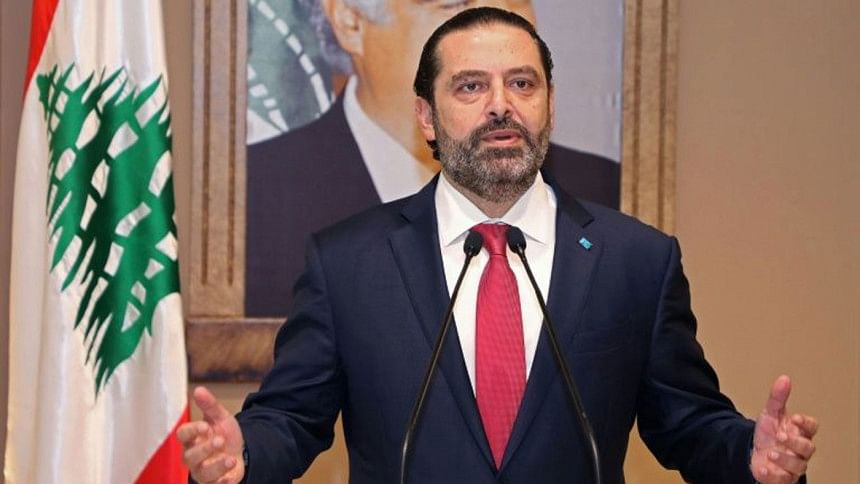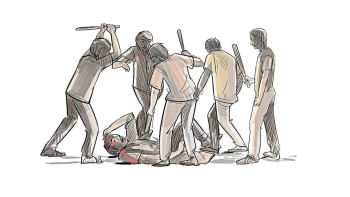The prodigal son’s return and the uncertain future of Lebanon

In a scene reminiscent of last year's massive protests that had led to the downfall of Saad Hariri, Lebanon's prodigal son, the streets of Beirut were filled with protestors on October 17, 2020. They walked past the Martyr's Square, the central bank and the parliament building before gathering near the country's crumbling port. Then there was silence, and then candles were lit near ground zero—site of the recent Beirut explosion. This is how the people of Lebanon marked the first anniversary of their protests against the misadventures of the country's ruling political elites.
But what has really changed over this one year? Economically the country has plunged into one of its lowest points since the 15 year civil war that ended in 1990. Inflation has peaked to a staggering 120.03 percent (as of August 2020, Trending Economic) putting the already struggling Lebanese Pound under increasing pressure. Food inflation—as reported by CNBC—has spiralled to an overwhelming 190 percent. Unemployment rate crossed the 30 percent mark in May, 2020, according to the same report. The country's gross public debt soared to USD 93.40 billion in the first six months of 2020, as per data released by its finance ministry. It is an increase of 8.94 percent compared to the first half of 2019.
Life overall has suffered. Power outages due to fuel shortage—in certain areas up to even 20 hours per day—have forced hospitals to limit their operations, that too at the height of a global pandemic. "Clouds are gathering and we might be heading into a storm... If we do, what is the current capacity of our hospitals considering recent events? Will we be forced into another lockdown? Can we still change course and avoid a surge? We can, but it will not be easy," suggested Firass Abiad, director general of the Rafic Hariri University Hospital, while voicing his concern over the situation on Twitter.
People are unable to buy food—80 percent of the food in Lebanon comes through imports which have been affected by the country's rising external debt, which stood at USD 34,798.7 million in June 2020, a 7.82 percent increase from June 2019 (data from Trending Economics)—have been forced to grow their own produce. Many have lost their savings, thanks to the country's economic meltdown. For the majority of the population the future looks bleak. And amidst all these happened the Beirut port blast, pushing the economy and the nation closer to the brink, deeper and more desperate than the woes that had triggered the protests last year.
Politically, however, not much has changed it seems. After a year-long sabbatical the prodigal son is back again at the centre stage of Lebanese politics. Saad Hariri has been entrusted with the responsibility of forming the next government of Lebanon after he received 65 parliamentary votes out of 118 on October 22.
Prior to his "election", in a live interview with MTV television channel, the most prominent Sunni Muslim leader of Lebanon oozing confidence said, "I am definitely a candidate". "I will not close the door on the only hope left for Lebanon to stem this collapse," he further added.
So, here we have the man who had had to bow down to the relentless demands of the protestors last year, back in full glory, trying to salvage the nation and the economy from the very crisis that spiralled out of control during his tenure. Not that Hariri alone is responsible for the plight of the Lebanese people, but it cannot be denied that his government had a role in the failure in managing the economic affairs of the country before things reached the tipping point.
But the return of Hariri, while surprising is not an unexpected move, not at least for those who are familiar with the delicate structure that holds the fragile and fragmented political system of the country together. There are the Maronite Christians and there are the divided Muslims; there are the Druze, the Armenians and there are a few secular groups. And all of these groups have their own vested interests which they prioritise over the interests of the republic. And in a diverse ethno-religious political landscape such a Lebanon's, practicing secular Democracy perhaps translates to serving the interests of all these groups so that everyone can hold their peace.
In the context of the troublesome history of Lebanon, way back in 1943 a National Pact was agreed upon by the various political factions. It was an unwritten agreement that dictated the terms of a delicate balance among all parties: a parliament with a 51 percent Christian majority; a Maronite Catholic as the president of the Republic; a Sunni Muslim as its prime minister, a Shiite parliament speaker, a Druze chief of the general staff of the armed forces, and Greek Orthodox Christians as deputy speaker of the parliament and the deputy prime minister. Ever since the multi-confessional state of Lebanon has been led and exploited by these vested groups—collectively, to the extent that this has become the ruling political elite: a group so powerful that even the unrelenting protests of the entire nation could not break this vicious pact.
"We don't have one head of state, it's a group of men, they have agreed to divide the spoils of the state at every level. It's a system that you can hardly topple," told Carmen Geha—associate professor in public administration and an activist—the Associated Press, referring to the system of exploitation that has been created by this powerful group over decades.
When Saad Hariri resigned last year, some thought this might perhaps shake the foundation of the political mechanism that is sucking Lebanon out of its resources. But things didn't improve; if anything things got worse. Because Hariri—or his party—alone was not the reason behind the economic collapse of Lebanon. It was the system.
And the system remains. But Hariri is promising to push through the reforms suggested by Lebanon's former coloniser: France. Even if Hariri succeeds in forming a cabinet of independent technocrats to carry out the much needed reforms, he faces two major hurdles: Hariri lacks the support of the major Christian block, including the Free Patriotic Movement headed by the president's son-in-law Gebran Bassil. Second and the one fraught with more difficulties: navigating the complex maze that is the political landscape of Lebanon, satisfying all quarters, while taking measures that would be unpleasant to them all. Hariri is faced with the biggest challenge of his political career and the stakes are too high, and for everyone.
Betting on Hariri to be the saviour might be over-optimistic. He is just one man, that too a part of this group of establishment elites. And the establishment and their system are going to be around. And there remains the possibility of this collective, powerful group of puppeteers pulling the strings no matter who sits in the cabinet, no matter who the prime minister is. Lebanon's woes are unlikely to end anytime soon.
Tasneem Tayeb is a columnist for The Daily Star. Her Twitter handle is: @TayebTasneem

 For all latest news, follow The Daily Star's Google News channel.
For all latest news, follow The Daily Star's Google News channel. 



Comments